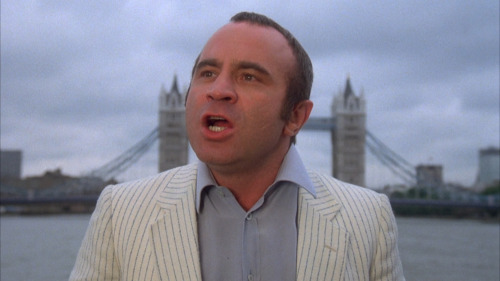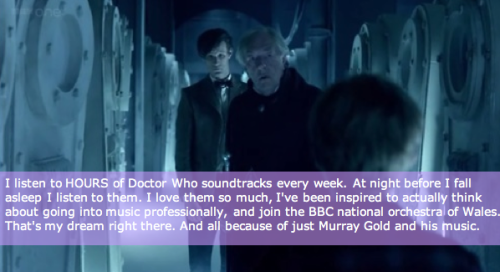#murray gold
Murray Gold returning and remixing ‘A Noble Girl About Town’ for an older Donna is a must
The Long Good Friday
Directed by John Mackenzie
Screenplay by Barrie Keeffe
UK, 1980Watched on 9th June 2014
First viewing
I didn’t like this film as much as I’d hoped. Bob Hoskins gave a fantastic performance and there were some shockingly brutal scenes, but perhaps I’m too disconnected from the time and place to appreciate the full impact of the story.
Also, I couldn’t stand the soundtrack by Francis Monkman. (Interesting to note the similarity between this motif and the 11th Doctor’s theme by Murray Gold…)
Post link
The #DoctorWho Series Nine Soundtrack album is out on April 27 and is being released as a limited edition slipcase version with a booklet of my #PeterCapaldi retro poster designs. Pre-order it from http://drwho.tmstor.es/cart/product.php?id=36956
Post link
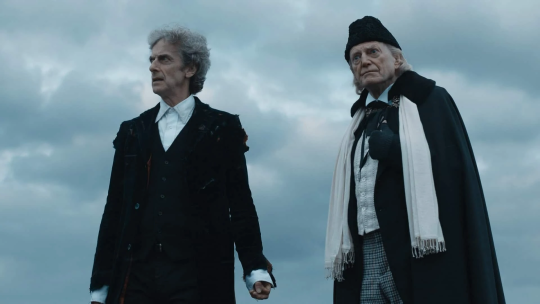
My late and great friend Quin was a Doctor Who fan. He and I watched many an hour of Doctor Who on Netflix while we lived together. The beautiful thing about watching Doctor Who with Quin was that we each experienced the show differently. Quin tended to like the romance stuff while I was more into the weird sci-fi elements. This difference was possibly no better exemplified than through our reactions to regeneration episodes. Having started on the Ninth Doctor, Quin needed a couple of weeks to mourn his passing before he could move on to David Tennant. While I do take a moment to say goodbye to the Doctor, a part of me is ready to move on to the next. Quin eventually warmed up to David Tennant and went through the same mourning phase after he left. Contrarily, my reaction to hearing the line “I don’t want to go,” was to say “Ew, go.”
Modern Doctor regeneration episodes are often gooey with mawkish sentimentality, all the more so when it’s also the showrunner’s final episode. It’s a trend that started with the Tenth Doctor and has continued so far. The closest approximation to such a drippy farewell from classic Doctor Who would be perhaps the Fourth Doctor dying around friends he barely knows, or the Fifth Doctor’s talking heads. Most of the classic Doctors die unexpectedly or off-camera. With “Twice Upon a Time,” being both Peter Capaldi and Steven Moffat’s final story in Doctor Who, we expect a bit of self-indulgence. We’ll grant them the odd flight of fancy as a sort of victory lap. We expect them to play the hits. But if I’m honest, it’s still kind of a lot.
I can’t imagine it’s an easy balance to achieve with a final episode of anything. There’s a desire to tell a compelling story while also crafting a sort of curtain call for all of the players. In the case of “Twice Upon a Time,” the former concern of compelling storyline doesn’t appear to be one of which Steven Moffat has burdened himself with. This isn’t an insult, merely an observation. An observation I believe is important when you consider Steven Moffat has always been the big ideas guy. Like the Twelfth Doctor saying “Can’t I ever have peace? Can’t I rest?” Moffat has decided to relax a little, and I’m so uncomfortable. Steven Moffat is in full-on rest mode. He’s your dad, you have friends over, and he’s walking through the kitchen with an open robe and day-old drawers on. Dude doesn’t give a fuck. The worst part is, he’s lingering and asking your friends questions about school. Mortifying.
Ok, so maybe it’s not just Steven Moffat being a little self-indulgent with their writing. I think I needed to vent because I just watched the opposite of “kill your darlings.” Steven Moffat took his darlings, this invasive species made in his image and said “Be free my darlings!” Like Tarantino and feet, David Lynch and dangerous women, or Larry Clark with shirtless dudes, Moffat has his own signature fixations. Who could forget his Edwardian dominatrix fetish as seen with Madame Kovarian, Missy, or Sherlock’s own Irene Adler? Or how about the time when the Teselecta extracts people at their time of death? Or when Missy extracts people at their time of death? Or when Testimony extracts people at their time of death? That one is definitely on display. But out of all of Moffat’s calling cards present and accounted for, perhaps the most insidious would be his casual misogyny.

With the introduction of the First Doctor into a modern Doctor Who setting, Moffat, in all of his infinite wisdom, decided to take the hard stance that the First Doctor, an alien from Gallifrey, would be hung up on 1960’s sexism and homophobia. It’s all done in a very winking fashion as well. “Look how far we’ve come since the backwards ’60s! Isn’t it crazy people used to talk like that? We’re so much further along now.” Like when Mel regenerated into River Song and the first thing she did was weigh herself and go shopping. Which is feminism because women do be shopping. I could have gone with one line that may have come off as iffy, but this was a recurring joke that felt dishonest to the character of the First Doctor. The First Doctor would never compare women to glass. He expected women to rise to their potential, not dust his fucking TARDIS. The jolly old smacked bottom line, on the other hand, is of course something he has and would say. So fair dos.

Thematically, introducing the First Doctor is a pretty clever move. As I mentioned above, I wasn’t a big fan of the Tenth Doctor’s departure. I began to wonder if the Tenth Doctor’s actual cause of death wasn’t old age while making his farewell tour. This story feels as though Moffat is trying to reinvent the concept but from a different angle. I touched upon it briefly in my previous review. The key difference being that while the Tenth Doctor didn’t want to change, the Twelfth Doctor doesn’t want to keep changing. He’s tired of the constant cycle of death, violence, and heartbreak. It’s fortuitous then that he should run into another man also late for his appointment with the reaper. That man of course is Mark Gatiss’ Captain Archibald. You thought I was going to say the First Doctor, didn’t you?

The introduction of the First Doctor merely completes a theme that would be otherwise non-existent without Captain Archibald. You see, just before appearing before the Doctor, the Captain had been staring down the barrel of German pistol, both he and his apparent enemy in a stand-off. We watch the Captain transition from a soldier bravely facing his demise to a man forced to sit and consider his entire existence. Why this pertains to the First Doctor is that it was through humans that he was able to become more than a renegade. It’s appropriate then that the First Doctor be present to witness Captain Archibald grappling with the end of his mayfly existence. The two Doctors need his human experience far more than that of each other. And certainly, they aren’t getting it from Bill.
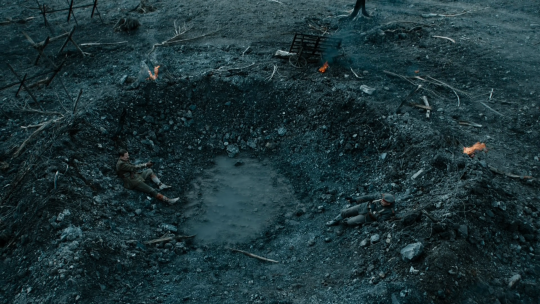
The glass replica of Bill is an odd story device that I don’t understand. Her primary function is to make the Doctor distrust Testimony, as anyone taking on his dead friend’s face must be evil, right? And this is the real issue with including Bill- it doesn’t make any sense. For starters, what point did Testimony make Bill? Was it when Blue Man Group shot a Looney Tunes hole through her chest? Or was it when the Cybermen turned her into Cyber Bill? Or maybe it was when Heather converted her body into a “sentient oil,” thus ending the human life of Bill Potts? No? She remembers all of that? Oh. Evidently, Bill died young, or sentient oil doesn’t age, or maybe Testimony doesn’t respect the ageing process and remembers humans as young? The other weird aspect is that the Doctor flip-flops on how he treats her. In one scene she’s just a replica, in other scenes, the Doctor is referring to her for advice. The episode can’t seem to decide if Bill is genuine or as real as a three dollar Bill.

Possibly the worst part of Bill’s introduction is that for a brief moment, they tease a cameo from Carole Ann Ford with Bill’s silhouette. It could have been one of the most exciting moments in Doctor Who history, and instead, it’s like “What? Why? We already said goodbye to Bill. Why is she here?” The First Doctor promised Susan he would be back and they had the perfect set-up. It’s like watching a bad movie where the characters are watching a good movie. It’s not a great idea to make the audience think about the better story we could have had. This is in no way a slight on Pearl Mackie either. I just can’t shake the idea that focusing more on Captain Archibald may have been a more effective use of screentime. But it’s that desire to do a curtain call, I suppose. One of which even brings back a few other Moffat inventions- Rusty the self-hating Dalek and Villengard.
While I complained about the old fashioned way they depicted the First Doctor, I was pleased by the scene where he can identify the asymmetry of Testimony’s glass face. That is how you present a classic Doctor in a modern Doctor Who setting. His methods are practical, but his observations are rooted in science. By looking with his eyes, he was able to deduce that she must be based on a real person, as a computer would not render an asymmetric face. It’s a marriage of the old and new far more effective than the First Doctor demeaning women. The First Doctor’s observation inspires the Twelfth Doctor to explore deeper answers using one of the greatest databases of all time- the Dalek Hivemind.

After a quick escape from Testimony in the First Doctor’s TARDIS, the Doctors, Three Dollar Bill, and Captain Archibald travel to Villengrad where Rusty has tapped into their legendary weapons systems. Daleks outside their casings scurry around the base of a tower where Rusty has set up a sort of sniper nest for taking out Daleks. It’s cool I guess. I like Rusty, so it’s a welcome treat to see him again. I also like that he didn’t die, so future writers can explore the concept of a morally ambiguous Dalek, should they so desire. The Doctor talks Rusty into helping him because helping the Doctor hurts the Daleks. It’s an enemy of my enemy situation, and it’s enough to keep the Doctors alive at the hands of a very deadly Dalek. Using Rusty’s connection to the hivemind, we learn that Testimony is merely a group of distant humans taking it upon themselves to document the lives of the dead. As the Doctor said- it’s not an evil plot.

During all of this, Mark Gatiss is busy giving the performance of his life as Captain Archibald. We find that the reason time stopped before his death was from Testimony’s need to archive his life. But in the waiting, he has found that he has lost his nerve. Like the Doctors, he must face his death. The trade-off is that Testimony will give the Doctor Bill in exchange for the Captain, which honestly, doesn’t make much sense. I don’t even know why this is on the table. Nothing about how Testimony operates makes a lot of sense. They’re benevolent, but sneaky and kidnappy. They offer to exchange life for life. When the hell did they pick up Bill? When the hell did they pick up Nardole? The Doctor, a Time Lord, could barely pilot his miracle time machine to save the humans from the previous episode, so he had to leave Nardole behind. Do you mean to tell me that a group of future humans can pinpoint Nardole’s point of death in a satellite next to a black hole with accuracy? And once again, like Bill, did Nardole die young?

I think this is where the goodwill of the audience begins to feel strained. More than anything, it’s a writing issue. It smacks of a first draft. Not only are bad ideas explored, they’re revisited until they lose any initial cleverness. Nardole isn’t just bald, he has invisible hair and glass nipples. I’ve complained in these reviews that we don’t learn much about Nardole, but I could have gone the rest of my life without learning either of those things. Much of the dialogue in this episode feels excessive. The First Doctor can’t just one and done it with the sexism, they have to keep returning to it. The Twelfth Doctor can’t just say “Oh, and you mustn’t tell anyone your name. No one would understand it, anyway. Except children.” He has to draw it out with “Children can hear it sometimes… If their hearts are in the right place… and the stars are too… children can hear your name.” Steven, mate, edit! It’s like every clever line of dialogue is wrung out for every drop of meaning until nothing clever remains. It reminds me of the Leela quote from Futurama- “Fry, remember I when I told you about always ending your stories a sentence earlier?”
Along with saying goodbye to Steven Moffat and Peter Capaldi, we’re also saying goodbye to Murray Gold who is at his most cloying with this cheery Christmas score that doesn’t match the tone. As I said in my previous reviews, I much prefer Segun Akinola’s music to his. I don’t mean to badmouth Gold’s contributions to the show, he’s had some solid bangers. Generally, it’s just not my style, much like Christmas episodes aren’t my thing either. However, as Christmas episodes go, this is the least annoying one to date. The fact that it’s Christmas only becomes apparent when they return the Captain to his crater only to have his death averted by Christmas carolling. Using a bit of time meddling, the Doctor was able to drop Captain Archibald into the relatively safe Christmas Armistice- a time when British and German soldiers came together for a cease-fire on Christmas Day. Before saying goodbye, we learn that Captain Archibald’s last name is Lethbridge-Stewart, which I found less hokey this time. It’s a nice way to do a Christmas episode in that it doesn’t dictate much of the rest of the proceedings. Though it is the only moment wherein the incongruous music fits.
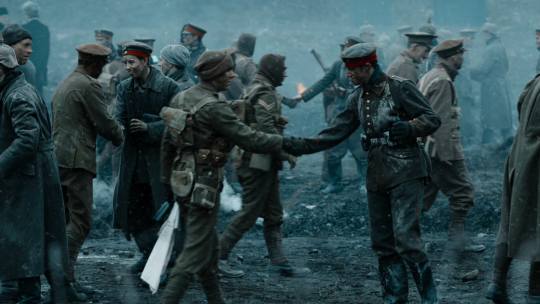
The first Doctor can move on to his next regeneration after realising that becoming a Doctor of war can be a positive thing. Seeing the soldiers come together allows him to see that along with the fear and death comes joy and prosperity. I was reminded of Latimer’s description of the Doctor from “The Family of Blood,”- “He’s ancient and forever. He burns at the centre of time and he can see the turn of the universe… And he’s wonderful.” The First Doctor rejoins fake Ben and Polly and reverts back to William Hartnell to regenerate into the Second Doctor. It’s been nice to see David Bradley playing the First Doctor. It’s something only Doctor Who can do, using the person who played William Hartnell in a biopic to then go on and play Hartnell’s Doctor for real. The man just works so well as the First Doctor. My only qualm with his performance is that he never feels as mischievous as the First Doctor could be. Hartnell had a sort of goading quality that I find lacking in Bradley’s performance.

The Twelfth Doctor says goodbye to Bill and Nardole and tells them that he needs to make his choice alone. Even after everything he’s seen, the Doctor can’t decide if he wants to regenerate or not. Personally, I could have gone for not. I loved Capaldi so much that I could have stood to see him go on for as long as Tom Baker. He brought a casualness and vulnerability to the role in a way I don’t think any have done quite as well before him. But all good things must come to an end. It’s pretty obvious though what the Doctor’s choice is going to be. The universe has convinced him to stick around, but first he has a few things to say to the next incarnation. In a fourth-wall breaking moment, the Doctor acts as a mouthpiece to Chris Chibnall and literally lays out the foundation for the Doctor’s morality. This is why when the Doctor says “They’ll get it all wrong without me,” it doesn’t just feel pointed, but prophetic.

The Doctor closes his eyes and accepts his regeneration as the regeneration energy arcs and sparks, exploding every cell in his body. The Doctor reopens her eyes and they are the brown of Jodie Whittaker’s eyes. Even though I now know the lacklustre writing that is to follow, I still find myself overjoyed to see the Doctor turn into a female. I was surprised to see that it still felt exciting. Much of Twice Upon a Time is so leisurely that it’s easy to forget that it contains the most controversial scene in Doctor Who since the Sixth Doctor choked Peri. I am glad I rewatched this episode because it was nice to remember a time when the future of Doctor Who felt exciting and new. In this way, rewatching series ten has reminded me of the exciting possibilities on the horizon with the Fourteenth Doctor.
And that’s me for the tenth series of modern Doctor Who. When I started this rewatch, I was sceptical that my opinion would change much. Coming away from it, I feel as though it may be Moffat’s finest work in the series. It’s as good as anything from the Russell T Davies era, if not better. That is, of course, entirely arguable. One of the things I enjoyed most about this rewatch was getting to share it with my boyfriend. His contribution to these articles was subtle, but the key to helping me organise my thoughts and find direction in my writing. I am also grateful to my friend Taryn who gave me the initial challenge of giving this series another go. We’ve talked about it a lot over the last few months- how Doctor Who can change for you over time. We remove the expectations preceding a first time viewing, and what remains is what is. It’s a nice reminder that Doctor Who doesn’t have to be what you expect in order to be good.
A Call From Trenzalore
Murray Gold
Uploaded by DoctorWhoInfinity
Deep Breath (2014)
Features the music underscoring Clara and Twelve’s scene in the TARDIS, as well as the Eleventh Doctor’s cameo.
Tribute to and character study of the Tenth Doctor and Rose Tyler from Doctor Who.
The song, Song for Ten, is from the soundtrack and appeared in The Christmas Invasion (without the lyrics referring specifically to Doomsday) and as Murray Gold’s instrumental in The End of Time.
I listen to HOURS of Doctor Who soundtracks every week. At night before I fall asleep I listen to them. I love them so much, I’ve been inspired to actually think about going into music professionally, and join the BBC national orchestra of Wales. That’s my dream right there. And all because of just Murray Gold and his music.
Post link

